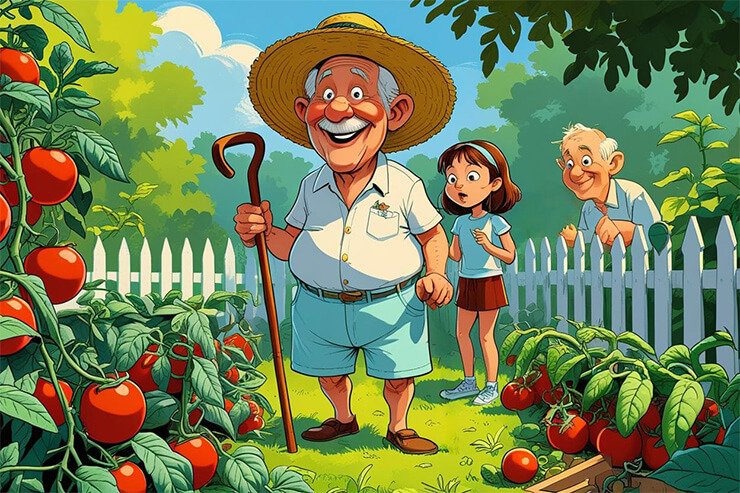Read by Matilda Longbottom

Early every Spring, Dad would drive my Uncle Clarence to the Red Mile racetrack to collect a trunkload of manure. Clarence didn’t live out in the country. He was smack in the middle of a Lexington subdivision, so his neighbors weren’t enthused about the smell. But Clarence cared little for the regard of his neighbors. They were a nuisance to be endured. Their trees shed leaves all over his neatly trimmed lawn and beloved vegetable garden. He’d rake them up and pour them over the fence, saying, “Not my trees. Not my leaves.”
We tried to convince him that it was best to just put the leaves on the curb. He’d already raked them into the trash can. “It’s just common decency, Clarence,” Mom would say.
“If that hussy next door can lay out in the sun all day, wearing nothing but her underclothes, and I can’t sit in my jockey shorts on my own back porch, then she can rake leaves.”
“She was wearing a bikini. And you weren’t sitting,” Mom reminded him. “You were shooting at the squirrels with a shotgun, right in the middle of town, in your jockey shorts. That’s illegal, Clarence.”
“The shorts or the shotgun?”
“Both.”
“Them damned squirrels don’t care what I’m wearing,” he muttered as he grabbed another pitchfork of horse manure and lobbed it into his tomato bed.
The manure worked. His tomatoes and onions were prize-worthy. He sold them on a little table in the front yard, where he’d sit with his cane across his lap. Anyone coming to buy his produce would have to watch themselves, as he wielded the cane like an old schoolmarm, punctuating his points with wild jabs or smacking at their children who tried to squeeze the tomatoes.
The worst part of the Summer was runner-bean season, usually in mid-July for Clarence’s backyard farm. The sun beat down through a cloud of humidity. My T-shirt would be soaked through before I finished the first row. Each tug on the vine would send big June bugs flying, most of them into my face and hair. “Don’t pull the vine out of the ground, girl,” Clarence would say, his cane poking my side.
I’d wipe the back of my hand over my dripping face and mumble my grievances to the dirt and manure.
“Huh?” he’d ask, every time I did this.
“Nothing.”
“That’s right, nothing. Giving you a whole crop of these, ain’t I?”
“Yep.” A crop we’d have to break and string and blanch and can. I was a city girl, but we all loved home-canned vegetables, so I helped my mom with the slippery tomatoes and squeaky beans every Summer. At least our kitchen was air-conditioned. Being in the buggy, stinky dirt on my knees was not my idea of a modern childhood.
But Clarence was good to his help, really. He kept his ancient International Harvester refrigerator full of ice-cold Mountain Dew. His cookie jar was usually full, too, unless I’d just visited. All his outdoor meanness, all the sternness of the old farmer he used to be, would fade away while we sat at his rough wooden table, guzzling caffeine and dosing ourselves with sugar. I learned to love the rhythmic blast of his oscillating fan when it was my turn in its breeze. I learned the reward of hard work and the bliss of rest.
And I learned how to handle that shotgun, too. Once, when my mother dropped me off to work the garden for him, Clarence spotted rabbits in the early lettuce. He grabbed his old Winchester off the gun rack, shoved it into my arms, and pulled me onto the porch. “Get ‘em!” he said, pointing to the furry thieves by the back fence.
I raised the shotgun to my shoulder and pulled the trigger. My ears rang, and my shoulder ached from the recoil.
“Bullseye!” he shouted, doing a clumsy jig around the pivot point of his cane.
We were just about to survey the murder scene when sirens sounded in the distance.
Clarence dug his gnarled fingers into my arm. “That hussy’s called the law on us, girl. Get in the house!”
We scurried back inside and stashed the rifle under his bed. He turned on the TV, and we watched “The Andy Griffith Show” in black-and-white, slowing our breathing and waiting for the front door to come crashing down.
The knock came a minute later, right in the middle of Aunt Bea’s supper speech. Clarence hobbled into his foyer and cracked the door. I stayed put, frozen to his brown couch.
“Yes, sir, officer. I heard it, too. Don’t know where that came from.”
I couldn’t understand the reply. Cold sweat beaded on my forehead.
“Well, I find that real interesting, officer. I really do. Because that hu-lady, well, I hate to say it, but she lays out in her yard naked, sir. It’s just indecent. I’m wondering if she’s telling tales on me because I fussed at her to put a shirt on. My little niece is here, and I just don’t think it’s right—”
Another muffled sentence.
“Well, I’d appreciate that. And tell her, I don’t even own a shotgun, and that’s the truth.”
The door closed. My heartbeat didn’t slow until I saw the squad car pull out of Clarence’s gravel drive.
“They ain’t taking us alive, girl,” Clarence said as he fell back into his armchair. “Not today.” ❖
About the Author: Rebecca Brothers lives in her native Kentucky, where she spends her Summers killing the flowers she plants every Spring. She is better at teaching English and writing short fiction, essays, and middle-grade novels, where she can’t underwater her words.


 Previous
Previous

